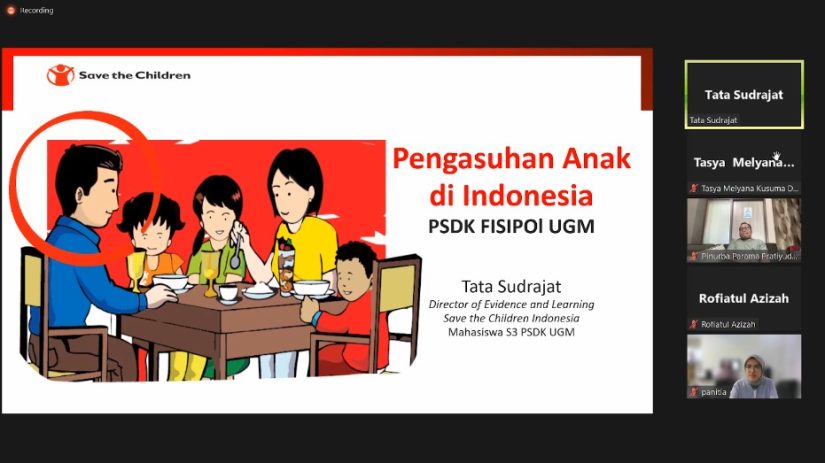
Yogyakarta, May 12th 2023─The high birth rate in Indonesia raises big questions about people’s upbringing. This problem arises because of an imbalance between the roles of fathers and mothers in child-rearing. Tata Sudrajat, Director of Evidence and Learning of the Save The Children Indonesia Foundation gave his response in the Social Development Talks webinar series on Friday (12/5). The event titled “Children’s Care in Indonesia” organized by the Department of Social Development and Welfare of UGM, emphasized how families in Indonesia meet the needs of children.
As a child’s first socialization and education agent, the role of the family certainly determines how the child’s character will be in the future. Unfortunately, to build an ideal family ecosystem, they have to face many obstacles. Not infrequently too, these obstacles make the children become the victims. “We can see the numbers of neglect, sales, and even early marriage among children are very concerning. When families face various problems, especially welfare, children often become victims,” said Tata.
Tata explained that many children’s problems are actually caused by family dysfunction. “This family dysfunction causes children to not get the role they need in their development. We can see, in children who have emotional disabilities, many parents are unable to carry out their role in their children,” said Tata. Not only about parents’ ignorance, family dysfunction also arises due to economic conditions that are not yet fully prosperous. House conditions, sanitation, and parental behavior can greatly affect the condition of the family ecosystem in children.
The Central Statistics Agency for the Population Survey Module in 2010 stated that more than 12.5 million children under 15 years of age do not live with their parents. This number is further divided into several percentages, namely 88% are raised by extended family, 59% by grandparents, and 29% by other relatives.
“The question is whether grandparents, especially those who cannot afford it, receive assistance from the government. I’ve heard from the Ministry of Social Affairs, they say there has been no assistance directed at grandparents who are taking care of children,” added Tata.
This condition of minimal welfare and government attention is considered quite worrying when it is associated with meeting the needs of childcare.
“If you ask, what is parenting? Many answered, love. Not really wrong, but it’s not enough. Therefore, Article 1 of the PP44 2017 states that attachment, safety, and welfare that are inherent and sustainable are also included in the parenting aspect,” said Tata. He also added that the fulfillment of this role is mostly done by mothers. In fact, the support of the father’s role is actually very important in providing education, protection, and affection for children. Tata hopes that the community and the government can pay special attention to this issue of childcare patterns in Indonesia.
